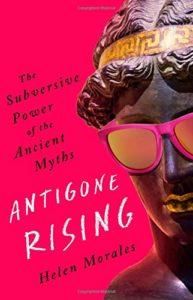Rediscovering Antiquity
The main purpose of ‘Applied Classics’ as we define it is to put our learning about classical antiquity to good use in the modern world. One secondary impact of many Applied Classics projects, however, is that they can get people looking at antiquity with new eyes. As we ‘deploy’ ancient material in new ways, we get to know that material differently, and this can lead to us questioning lots of long-held assumptions about e.g. Athenian democracy, ancient ideas of gender, how Roman propaganda worked, what ancient ‘expertise’ consisted of, or how poverty was experienced in different ancient societies. Applied Classics involves a two-way dialogue between ancient and modern, and both Classicists and the wider public can benefit from having our long-held ideas of antiquity stretched and disrupted.
Some of our ‘Applied Classics’ projects have relished this simply as a happy by-product of their work; others have identified ‘rediscovering antiquity’ or ‘rethinking Classics’ as one of their core aims. The Climate and Classics project, for example, saw an opportunity to change how young people who have not had any prior exposure to Classics think about the subject, while deploying ancient case studies to teach about deforestation. One of our Migration projects actively exploits the public’s curiosity about Classics to draw them in and then revolutionise how we understand ancient mobility as well as modern migration. The Hippolytus Initiative, meanwhile, directly addresses misinterpretations of ancient texts: as scholars like Donna Zuckerberg have shown, ‘correcting’ how some people have misunderstood or misappropriated ancient discourses of gender is central to addressing issues like toxic masculinity today.
In the posts below, you can explore some ‘Applied Classics’ work which either sets out to change prevailing assumptions about antiquity or reflects on the benefits of doing so, as part of broader efforts to foster productive dialogue between ancient and modern.
Odyssey Britannia
In 2020, a team of three students – Kate Moran, Reese Waters, and Katie O’Hare – developed Odyssey Britannia, a virtual travel guide to Roman Britain. Developed during the Covid-19 pandemic, it was designed with two goals in mind: to give people unable to travel a chance to visit ancient Roman sites from the comfort… Read More
Climate and Classics: Deforestation
In 2020, a team of four students – Erin Limmack, Eleanor Pain, Ellis Williams and Taylor Williams – developed the following project. Its aim is to get young people thinking and talking about a contemporary environmental challenge, deforestation, via case studies from ancient Rome. Introduction Climate & Classics is offering a short (4-day) residential retreat… Read More
Classics for the Masses: learning for society and ensuring diversity
My perception and understanding of Classics are inextricably linked with its complicated history and reputation. For centuries, an education in Classics was exclusive to the upper classes and therefore limited to wealthy white men. Read More
Antigone Rising
A tongue fat from swelling. A fine flame coursing down through your limbs. Ringing in your ears and a fuzzy darkness blinding your eyes. As an undergraduate Classics student who has studied Latin for more than half of my life, I instantly recognise these words as expressions and symptoms of ancient love. Read More
‘Applied Classics’ done well involves exploration, not reductionism
This semester, I have gained a clearer understanding of the power and reach of Classics in the modern world; but I have also learnt about the social and ethical responsibilities that come with being a ‘citizen scholar’, and how important it is to be attuned to and wary of abuses of the discipline. From examining how Classical content is used and abused in our modern day, I have come to see ‘Classical applications’ as broadly falling in to one of two categories; exploratory, or reductive. Read More




